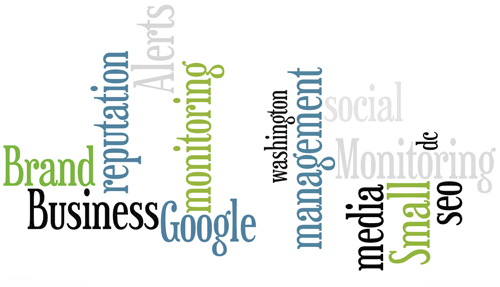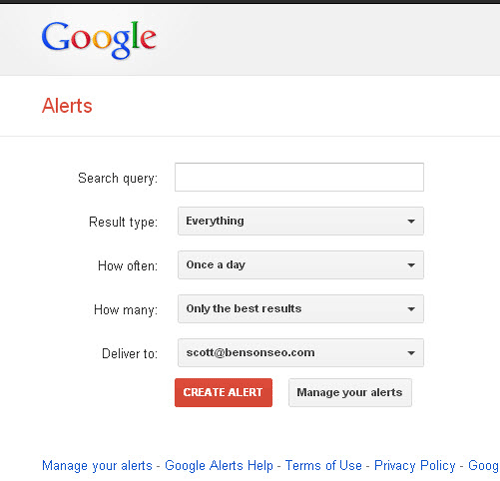
Google Alerts is a free service that sends you email updates anytime Google crawls a site that mentions a keyword or phrase you choose to monitor. Here are a few tips on using Google Alerts for reputation management:
Monitor Brand Mentions
This one is quick and easy. You want to be alerted anytime another website mentions your brand name or website. As you receive alerts you can monitor who’s talking about your company. If the mention is favorable, maybe you can reach out to that individual for a testimonial. If the mention is negative, you can start digging in to find out what went wrong and try to win back that customer. I’d recommend setting the alert for any variation of your brand and site name like this:
- “brand name”, “brandname”, “sitename.com”, “www.sitename.com”, etc. (without quotes)
At the bottom of this post I’ve included a screenshot showing how you enter your terms in the Alerts interface.
Find Out Who Links to Your Site
Links are SEO gold. Anytime another reputable site links to yours, the search engines see this as a “vote of confidence” and it increases the online authority of your site. Having an alert set up to notify you of these links allow you to quickly analyze what you did to earn that link. You can take that information and recreate the scenario to earn more valuable SEO links. (stay tuned for a link building blog post) Here’s what to enter into Google Alerts:
-
- “link:mysitename.com” (remove quotes and adjust for your domain name)
People are Discussing Your Product or Service
Using alerts for the name or your products or the service you provide is a great way to stay up-to-speed with your customer base. Find out who’s talking about your business and plan a way to engage with those individuals or businesses. It’s a great way to learn purchasing habits of your target market as well. What you’ll often find is people are writing blog posts about a product they recently purchased. More times than not, they’ll also provide a back story about why they purchased the product, the need they originally had and maybe even a quick review of your company or competitor. Hone in on the right combination of phrases to filter through the noise from less relevant sites.
Social Media Monitoring
The brand alerts you set in the first tip will carry over and alert you of social media mentions on sites that Google can crawl (they can’t crawl much of Facebook), but you want to go one step further with your social media monitoring. Assuming your Twitter handle is slightly different from your brand name, you want to add an alert specifically for that profile. I have an alert for “scott_benson” and “@scott_benson” just to be safe. Also, set “link:” alerts for all your social media profile URL’s like Google+, Facebook Fan Pages or anywhere you engage with customers and the general public.
Monitor Your Competitors Online
This one is fun. Copy the steps you performed to monitor your brand name keywords and your “link:” monitoring, but adjust the phrases to match your top competitor brand names. You’re now set to monitor your competitor’s successes and failures. Are they earning links from a source you can leverage as well? Did they spurn a customer? Can you begin to engage with that customer to begin earning their trust and later their business? The insights you can gain with this tactic are virtual endless.
How to Create a Google Alert
It’s pretty simple really. First you need to have a Google account, either through a Gmail address, or by registering another email address with Google. Next, begin by entering your search query. I’d recommend choosing a Result type of “Everything” to start as well as “All Results” in the How many field. The How often field really depends on the urgency of the information Google is sending you. I believe the brand mentions and links should be set to “As it happens”, but your competitor mentions could be set to “once a day”. Take a few weeks to experiment with the settings to find the right balance for your business.


Leave a Reply